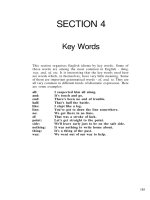reoirters key
Bạn đang xem bản rút gọn của tài liệu. Xem và tải ngay bản đầy đủ của tài liệu tại đây (176.23 KB, 2 trang )
Reporters gather information and write news stories. To
get information, reporters look at documents and also
observe the scene and interview people. These stories
appear in newspapers and magazines.
Reporters write about accidents, rallyes, sporting events,
society or political events. Reporters must write clearly
and effectively. They also need word processing, computer
graphics, and desktop publishing skills. Speaking a second
language is necessary for some jobs.
Some reporters appear on television and radio. Radio and
television reporters often report "live" from the scene.
News correspondents mostly work in large cities. Some report from
foreign cities about the events in the city there.
Reporters must meet deadlines. Some work in private offices, while
others often work in large rooms with other reporters. Television and
radio reporters interview curious onlookers, police, other emergency
workers, stars or politicians.
Reporters work long hours and sometimes have odd
schedules. They sometimes have to travel. At morning
newspapers, reporters work from late afternoon until
midnight. At evening or afternoon papers, they work
from early morning until afternoon. Radio and television
reporters work day or evening shifts. Magazine
reporters generally work during the day. Reporters
often have to work extra hours to meet deadlines. They
have to change their working hours to follow a story.
A college degree in journalism is preferred. Working at school
newspapers or broadcasting stations is good experience. In high
school, you should take courses in English, journalism, and social
studies, with an emphasis on writing.
Tick off „true“ or „false“.
1. 1.
Reporters
get
information
Reporters
get
information
from
documents.
from documents.
true
false
true
false
2. 2.
Reporters
always
must
Reporters
always
must
write
very
long
stories.
write very long stories.
true
true
false
false
3. 3.
TVTV
reporters
only
reporters
only
report
from
TV
studios.
report from TV
studios.
true
true
false
false
4. 4.
Many
different
people
are
Many
different
people
are
interviewed
byby
reporters.
interviewed
reporters.
true
true
false
false
6. 6.
They
have
odd
schedules.
They
have
odd
schedules.
true
true
false
false
7. 7.Sometimes
they
must
Sometimes
they
must
work
extra
hours.
work
extra
hours.
true
true
false
false
8. 8.
It´s
good
toto
work
atat
It´s
good
work
school
newspapers.
school
newspapers.
true
false
true
false
Form correct sentences!
1. and/gather/Reporters/write/information/news
stories.
....................................................................................................
2. effectively /write /clearly /They /and /must
...................................................................................................
3. large /in /reporters /work /mostly /cities /Some
...................................................................................................
4. sometimes/TV/radio/reporters/stars/and/
interview.
.................................................................................................
5. extra/often/work/deadlines/to/They/hours/meet
...................................................................................................
...................................................................................................
6. midnight/late/Some/until/work/from/afternoon
.................................................................................................
7. often /offices /work /in /They /large.
.................................................................................................
Answer the questions!
1. Where do the stories of a reporter appear?
…………………………………………………………………….
2. What skills do reporters also need?
…………………………………………………………………….
3. From where do reporters often report?
………………………………………………………………..
4. What do reporters write about?
…………………………………………………………….
5. In which kind of offices do reporters work?
………………………………………………………………………………………………
6. Who works day or evening shifts?
…………………………………………………………………………………………….
7. What school degree should a reporter have?
………………………………………………………………………………………………
………
KEY
Tick off „true“ or „false“.
Form correct sentences!
1. Reporters gather information and write news stories.
2. They must write clearly and effectively.
3. Some reporters mostly work in large cities.
4. TV and radio reporters sometimes interview stars.
5. They often work extra hours to meet deadlines.
1. 1.
Reporters
get
information
Reporters
get
information
from
documents.
from documents.
true
false
true
false
2. 2.
Reporters
always
must
Reporters
always
must
write
very
long
stories.
write very long stories.
true
true
false
false
3. 3.
TVTV
reporters
only
reporters
only
report
from
TV
studios.
report from TV
studios.
true
true
false
false
6. Some work from late afternoon until midnight.
7. They often work in large offices.
4. 4.
Many
different
people
are
Many
different
people
are
interviewed
byby
reporters.
interviewed
reporters.
true
true
Answer the questions!
1. Where do the stories of a reporter appear?
In newspapers and magazines.
2. What skills do reporters also need?
Word processing, computer graphics, and
desktop publishing skills.
3. From where do reporters often report?
They often report "live" from the scene.
4. What do reporters write about?
They write about accidents, rallyes, sporting
events, society or political events.
5. In which kind of offices do reporters work?
They work in private offices or often work in
large rooms with other reporters.
6. Who works day or evening shifts?
Radio and television reporters.
7. What school degree should a reporter have?
A college degree in journalism.
false
false
6. 6.
They
have
odd
schedules.
They
have
odd
schedules.
true
true
false
false
7. 7.Sometimes
they
must
Sometimes
they
must
work
extra
hours.
work
extra
hours.
true
true
false
false
8. 8.
It´s
good
toto
work
atat
It´s
good
work
school
newspapers.
school
newspapers.
true
false
true
false





